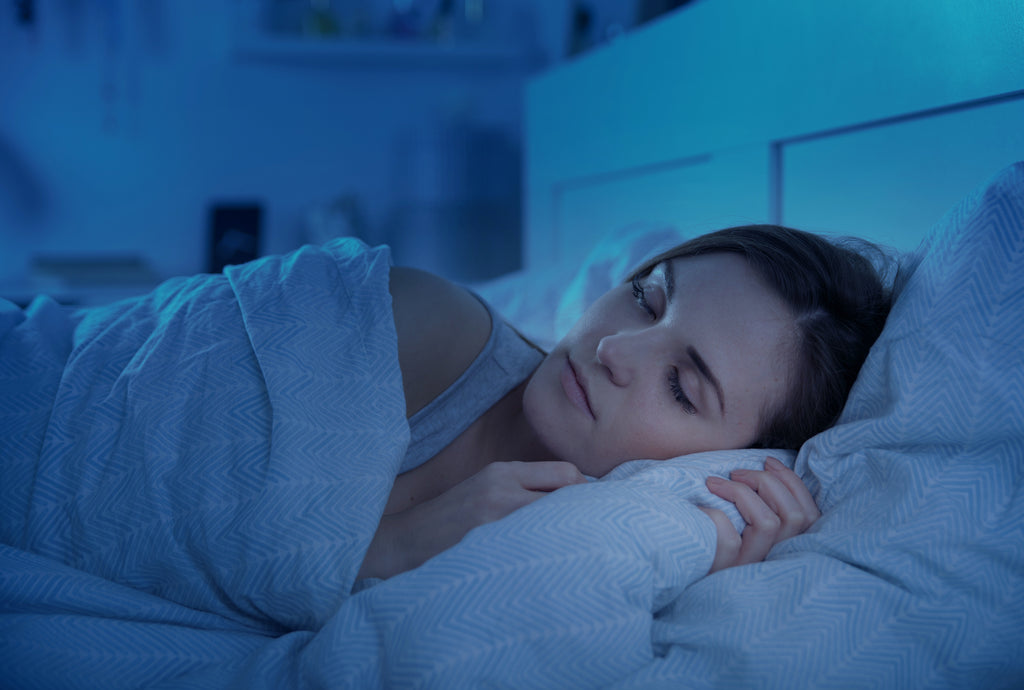Written by Elliot Reimers
Elliot received his B.Sc. in Biology/Biochemistry from the University of Minnesota; he is thoroughly passionate and educated about the science behind human physiology, nutrition, & dietary supplementation. He is a published author on many mainstream fitness/health media sites.
Chronic sleep deprivation is a dangerous condition, with clinical evidence showing that it can increase the risk of mental health issues, diabetes, body weight problems, muscle atrophy, and even sudden death. Yes, you read that last bit right: lacking sufficient sleep can potentially be fatal.
In this article, we are going to detail the top 10 most common causes of sleep disruption and several effective ways you can remedy the issue.
The Most Common Causes of Sleep Disruption
Aside from the multitude of metabolic ramifications that sleep disruption can impose, research shows that it also significantly impairs your brain’s ability to take in new information and think clearly. Thus, sleep disruption is a surefire way to wake up in a poor mood and lacking motivation to face the day.
Moreover, a lack of sleep can throw cortisol rhythms off, as cortisol is typically secreted in accordance with the body’s circadian clock. When your cortisol rhythms aren’t in line with your body’s internal clock, you will likely have trouble falling asleep at night, and lack energy during the day when you need it most. When sleep disruption isn’t actively treated, it turns into a vicious cycle.
But what exactly are the most common causes of sleep disruption?
1. Jet Lag
Jet lag (desynchronosis) arises from an acute disruption of your body’s inherent biological clock. This typically occurs after flying across multiple time zones (thus the term ‘jet lag’). Generally, the more time zones you travel across, the more severe the symptoms become.

Jet lag can bring about a multitude of unwelcome symptoms, such as lethargy, fatigue, insomnia, and headache.When your sleep-wake cycles are disrupted, as in the case of traveling through several time zones, your cortisol rhythms are thrown off and daily functions become quite a chore.
2. Depression and Anxiety
Depression and anxiety are two prominent risk factors for insomnia and other sleep disorders. Research demonstrates that roughly 90% of people who are diagnosed with depression experience sleep disruption.
Other depression-related sleep complications consist of difficulty falling asleep and excessive sleeping. By the same token, anxiety can impede one’s ability to fall asleep due to uneasiness and inability to relax.
If you’re having trouble sleeping because of anxiety, research suggests that supplemental vitamin Ccan be beneficial by blunting cortisol secretion in response to stress.
3. Diabetes
Both type-1 and type-2 diabetics find it tough to get adequate sleep due to blood glucose swings, frequent urination, and excessive night sweats. Coincidentally, chronic sleep deprivation (less than six hours per night) appears to significantly increase the risk of developing type-2 diabetes.
4. Menopause
According to a report by the National Sleep Foundation, 61% of menopausal women experience sleep disruption (especially insomnia). It is postulated that this arises from a decrease in progesterone (a sleep-promoting hormone) levels during menopause. Furthermore, estrogen fluctuations during menopause can disrupt sleep via hot flashes, night sweats, and elevated body temperature.
5. Musculoskeletal Disorders
Arthritic joint pains and inflammation can make dozing off to dreamland nearly impossible for some people. In severe arthritis cases, pain medications are necessary to ensure patients can get adequate rest. Other musculoskeletal disorders, such as fibromyalgia, have also been demonstrated to disrupt sleepdue to chronic pain and inability to relax (despite being fatigued).
6. Acid Reflux (Heartburn) or GERD
It is estimated that roughly 25-40% of the adult population battles acid reflux or gastroesophageal reflux disease (GERD), and research suggests this increases the risk of obstructive sleep apnea. Note that the terms acid reflux, heartburn, and GERD are thought to be synonymous, but they actually have different meanings. Heartburn is simply a symptom of acid reflux, whereas GERD is a chronic, debilitating form of acid reflux.

Acid reflux is a condition in which the highly acidic juices in the stomach flow back into the esophagus, bringing about intense burning pains and irritating sensations in the chest and upper respiratory tract. Both acute and chronic acid reflux can make falling and staying asleep hard. Unfortunately, lying down actually makes acid reflux worse; as such, it’s best to avoid food in the hours before bedtime and reduce consumption of acidic beverages, such as coffee and fruit juice.
7. Cardiovascular Disease
Congestive heart failure and coronary artery disease are two prevalent cardiovascular complications that have been connected to sleep disruption. The former arises from a lack of blood flow from the heart to the rest of the body, causing excessive fluid to build up in the lungs while you sleep; the latter causes chest pains and irregular heartbeat, which may bring about a heart attack while you’re asleep.
8. Obesity
It should come as no surprise that being highly overweight is strongly correlated with sleep disruption(especially obstructive sleep apnea). In fact, this is one of the most worrisome symptoms of obesity, with the American Heart Association declaring it a “major public health concern” due to the implications on cardiovascular health and likelihood of developing insulin resistance.
9. Screen Distractions (Smartphones, Tablets)
Once you’ve developed a routine around your smartphone, it becomes your life. We have seen incredible advancements in how we interact with technology, but that isn’t always a positive thing. More people are losing sleep now than ever thanks to constant interaction in front of screens such as tablets, smartphones, and computers. Contemporary research suggests that these “distractions” and brightly lit screens can disrupt sleep-wake cycles by throwing off your circadian rhythms, along with the obvious reason of keeping you up way past your normal bedtime messaging friends on social media.
10. Thyroid Malfunctions
Overactive thyroid (hyperthyroidism) can induce sleep-disrupting night sweats, while underactive thyroid (hypothyroidism) can bring about excessive lethargy and daytime drowsiness, making it hard to fall asleep at night.
Your diet can also impact the health of your thyroid gland; selenium, for example, is an important micronutrient that regulates thyroid hormone production.
Effective Strategies to Treat Sleep Disruption
When sleep disruption arises from a medical condition, it often resolves upon proper treatment of the issue. However, there are other strategies to use for treating sleep disruption; below you will find some of the most effective ways to improve your ability to fall and stay asleep.
1. Eat a Balanced Diet
Food is medicine for the body, so nourishing yourself properly is crucial for preventing sleep disruption. When you are deprived of nutrients, your brain doesn’t have the fuel it need to function, and cortisol levels increase to provide energy for tissues in the body. As a ramification of this, you might find it hard to sleep through the night.

Try to eat a good breakfast before you head out for the day; make sure it contains a balance of protein, carbohydrates and fats. If you don’t have time to eat throughout the rest of the day because of your schedule, you can make a homemade smoothie, buy a premade meal, or grab a meal replacement bar that you can eat on-the-go.
Be sure not to eat too late at night, though. Eating in the immediate hours before bedtime can disrupt your ability to fall asleepdue to digestive processes. Try and finish your last meal at least 2 hours before bedtime.
2. Keep Physically Active
Managing your stress is one of the most effective ways to treat sleep disruption. This is where physical activity comes into play, since going to the gym and maintaining a steady exercise regimen are great ways to reduce stress; even light physical activity, like going for a walk outside or doing some yoga stretches in your room is a fantastic way to alleviate daily stress.
Start small by doing something simple like going for a 20-minute walk daily. From there, you can gradually increase the duration and intensity of the exercise you do.
By keeping physically fit you’ll manage stress hormone production and ensure proper sleep-wake cycles. You’ll also likely feel more “worn out” when it’s bedtime, making it easier to fall (and stay) asleep.
3. Practice Meditation and Deep Breathing
Meditation, at its core, is a time to clear your mind and let go of stress. It can be as simple as sitting in a chair, closing your eyes, and focusing on breathing deeply through your belly and nose, rather than your mouth. (It might help to remind yourself to “breathe horizontally instead of vertically.”)

By doing so, you positively alter your blood oxygen levels and PH levels; in turn, this reduces stress and calms the adrenal glands and nervous system, making it easier to relax and fall asleep when it’s time for bed. You don’t have to do much meditating either, research suggests that even 5-10 minutes in the evening can help improve your ability to nod off.
4. Take “Power Naps” During the Day
There is research that supports intermittent “power naps” for enhancing well-being. Even better, there appears to be no negative effects on nighttime sleep in those who nap during the day.
If you find yourself with some spare time in the afternoon, lie down and take a brief nap. You’ll notice that you will feel much more alert and refreshed for ‘part 2’ of your day after you wake up.
5. Supplement with Melatonin
When your internal body clock and sleep patterns are out of sorts due to sleep disruption, melatonin can be a lifesaver. In fact, a large body of evidence shows that melatonin effectively restores healthy sleep patternsin people with sleeping disorders, like insomnia, and those that work graveyard shift and/or experience jet lag. You can find natural melatonin in Montmorency cherries.
6. Use 5-HTP
5-Hydroxytryptophan (5-HTP) is a metabolite of the amino acid L-tryptophan; it is ultimately necessary for your body to synthesize serotonin - a neurotransmitter that induces relaxation and can help with sleep.
Research contends that ingesting 5-HTP roughly one hour prior to bedtime increases the total time spent asleep and reduces the amount of time it takes to fall asleep. It also helps decrease food cravings late at night.
7. Silence or Stay Away from Your Mobile Phone
As touched on earlier, smartphones and other devices with brightly lit screens can disrupt your sleep and artificially manipulate your circadian rhythms. As such, at least 30 minutes before bedtime you should turn off or silence your phone/electronics. (Some people call this the “no-screen policy.”)

Focus instead on clearing your mind so you can get a good night’s rest. Don’t worry, there will always be time to check your social media feed and text your friends when you wake up.
Last, But Not Least: Have a Comfortable, Quiet Sleeping Space
The room you sleep in can drastically encourage or inhibit your ability to fall and stay asleep. Naturally, it’s best to create a space for yourself at home or on the road that is quiet, comfortable, and kempt.
If you have loud neighbors, or there’s a dog outside that won’t stop barking, you might want to invest in some ear plugs to help silence those distractions.
Using the aforementioned strategies along with having an appropriate sleeping space will surely enhance both your sleep quality and duration. Don’t put your sleep disruption on the backburner; sleeping is one of the most vital processes that your body requires regularly.





